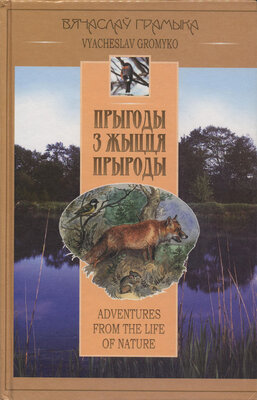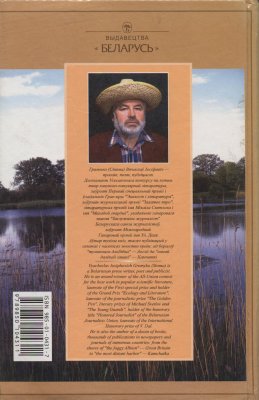Прыгоды з жыцця прыроды
Adventures from the life of nature
Вячаслаў Грамыка
Выдавец: Беларусь
Памер: 263с.
Мінск 2003
ON THE WOLF PATHS
Wolves appeared unexpectedly, although during the war years they left the forest in search for food and called on nearby villages and separate farms, attacking domestic animals. They lost practically all fear of people.
I remember my grandfather saying that my godfather, Kastus Mazalevich, who was a teenager then, saw a wolf, which ran into the sheep herd and at that moment he took it for a dog. He couldn't make out why the dog caught a sheep and didn't let it go. The boy, who had nothing about him to fight with, pulled off his hat and began to beat the enraged animal with it with all his force, then grabbed the sheep in both hands and tried to put it back into the herd. The boy and the animal fought for some minutes — one trying not to let the sheep go and the other — to keep the victim. Fortunately farmers came in time to help the boy and the wolf, unhurriedly, headed for the forest.
More than ten years has passed since that time. Spring floods washed off all the dirt, covered holes with silt, and forest and garden trees returned to life. Life was much the same now, with its joy and disappointments, happiness and troubles. Of course, there were much more troubles, but farmers, who got used to hard work since childhood, didn't complain of their hard life. They worked on the fields from dawn till night and the rest of the long day they were occupied working on their lots where they grew potatoes and cucumbers, carrots and onions.
Only in winter when the ground froze and was coated in snow, covered and needing a rest, did the farmers have some spare time at last.
Winter work was collective work and to a farmer providing himself with firewood seemed quite an easy task to do. Feeding
cattle with sweet scented hay stores in summer, milking cows and looking longingly at a piglet growing up in the pigsty — all this made a farmer happy.
Days and months passed. Years, quite unnoticed passed by one after another. Some episodes of the past life were gradually washed off in the memory.
So the farmers from the farmsteads forgot about wolfs. Maybe they didn't completely forget about them, but as wolves didn't attack their animals any more, the farmers recollected them more and more seldom.
One winter evening when it was quite late, we sat at the table, which my father had made just after his marriage when he started to live separately from his parents.
The tasty smell of the supper made everyone recollect that the Christmas fasting was coming to an end and it was just the evening when, in addition, to very modest food they also gave crushed flax-seeds and boiled unpeeled potatoes with sour milk while mother was busy at the stove and laying the table, father was telling my brother George about the night attacks of wolves. He told him that wolves met in the field lonely people who had lost their way or were simply returning home late and went after them right to their houses. There were also some terrible accidents when hungry wolves tore a man to pieces leaving only his boot with bitten-offlegs.
I was particularly impressed by father's words that wolfs eyes shone brightly like a lantern at night. I paid special attention to this though I was quite little then and was playing with my cat near the bed, throwing him a bobbin with a thread attached to it and then taking it away and laughed merrily when the cat tried to catch it with its paws and hold it.
But all the same, it must have been the time in childhood when everything you see and hear stamps in your memory forever. It must be really so because even now I remember, in detail, many episodes of my life of that time and I can clearly see our house, yard and all the neighborhood.
So in that evening when all our family gathered at home and mother invited us to supper, 1 wanted, without any reason, to play a joke.
“Oh, two lights flashed in the window there” I said.
My words were so unexpected that father stopped eating and threw a look at the window, but he didn’t see anything there, looked crossly at me and resumed his supper. I don't know what the others thought about it, they might have taken it as a joke or thought that 1 had really seen something, but coincidences do happen in life! Or maybe people can have a presentiment? I don't know whether it is so, but in a few minutes our dog R.apko began to bark loudly. The barking was somewhat unusual, loud and at the same time fearful. Then it became even louder and all of a sudden began to move away to the Papelyshev ditch.
Gradually fading the barking sounded in the frost air and was heard well even in the house. What was it? Who could frighten the dbg? It was late at night and all the farmers were already in their houses. It was practically two miles away from the nearest farmstead. Then suddenly the barking stopped. We could hear that there was something frightening in the street, the dog whimpered as if being torn to pieces. Father rushed out into the street. Mother and my brother ran after him. A little afterwards, without my coat on and knowing well that mother would scold me for that, I ran out, too. The dog wasn't whimpering any more, the barking was solid and threatening now.
After a while father, mother and brother came back.
“Why are you without your coat on?” said mother when she saw me. “Come on to the house, you'll catch a cold and cough again!”
“It's all right now. Don't cry at him,” said father, “You know, it was he who noticed the wolf first and we thought that he was just playing a joke.”
He had a pitchfork in his hands and my brother carried an ax. In astonishment I looked at him, not understanding what was happening. They entered the house and let the dog in, too. Everyone was excited and I realized that something unexpected and important had happened. Then I believed that the wolf had really come to the farmstead. When he noticed the dog he must have tried to secretly entice the dog away to the ditch. The dog tried to escape but could hardly fight with the strong old wolf. No doubt the wolf would have won in this fight with the dog if father,
brother and mother hadn't rushed to its rescue. On seeing people, the wolf let the dog go and jumped over the ditch and moved to the hill.
It wasn't the last night visit of wolves. Some days later wolves appeared in the neighborhood again. They wandered not far from our farmstead not daring to approach it. Then we learnt that in one of the farmsteads that was quite a distance from ours, they managed to get into the sheep-fold and slaughtered the only farmers' sheep. One could wonder at their adroitness and ingenuity.
From a large snow drift the wolves (one or several, nobody knew how many) got to the roof of the sheep-fold. Then the wolf made a hole in the roof and got through it into the sheep-fold. Of course, it wasn't difficult for him to slaughter his victim, but something else was strange — there was no other exit from the sheep-fold, the doors were reliably locked, but they could find neither bones nor hair in the sheep-fold. The wolf seemed to have run away with his victim through the same hole in the roof. The people were surprised: how could the wolf jump with his victim so high?
Speaking about the gray forest robbers it's necessary to note that a wolf is a big and strong beast. He has very strong jaws and instant reactions. As to slyness, he can equal a fox. Not a very large pack of wolves can tear to pieces a strong horse or a bull. In one night six or several wolves will leave nothing of a big horse, horse's ribs crack under wolfs' fangs, they crumble even large bones easily.
One can only wonder at the wolfs strength and voracity. He can easily run with his victim not smaller than a she-goat, carrying it first in front of himself and then throwing it on the back. He is very adroit at hunting hares, catching foxes. He can eat more than ten kilogram of meat at a time and up to 1.5 tons a year. Sometimes he can fast for a long time, not having any food for a fortnight. A wolf looks like a big strong dog. He has a strong muscular body of more than 1.5 m long. His weight is about 80 kilos. His coloring is red-ochre with a blackish shade along the spine and the belly is usually light gray, but sometimes you can come across a yellow-red or, on the contrary, a rather dark wolf.
Wolves live everywhere in our region. They inhabit forests and swamps. These beasts can be met in the fields with coppices, but, as a rule, they tend to live near places where people live. Wolves are in the habit of visiting sheds, pigsties, rubbish dumps. They don't shrink from eating carrion, but, of course, they prefer to attack domestic animals. Some wolf packs live only in backwoods, in places where it is difficult to get to, in the thicket of the forest, and eat only wild animals. Nevertheless, wolves also eat vegetable food, but not very often. In these cases vegetable food doesn't only substitute animal food; fresh green grass and tree roots, seeds, berries provide them with necessary vitamins.
I think many of us have seen a sick dog. A sick dog always looks for herbs and roots. So does a wolf.
A marriage play of wolves is long and lasts from January till March. Before that wolf packs begin to break up, and males start fierce fights which result in the so-called wolf “weddings”.
After a marriage play the male and female make their lair in an inaccessible place — somewhere under an uprooted tree, in a wide burrow or under a precipice. Pregnancy of the female wolf lasts a bit more than two months. Newborns usually begin to appear from the middle of April till the end of May. They are born blind and the mother wolf practically doesn't leave her wolf cubs in the first days and the father wolf provides her with food during this period. Wolf cubs can already see on the 11th — 12th day, they suck their mother's milk for 35 — 40 days, but already on the 30th day their parents begin to give them meat and also semi-digested food, which they belch in the lair.
 КНІГІ ОНЛАЙН
КНІГІ ОНЛАЙН


